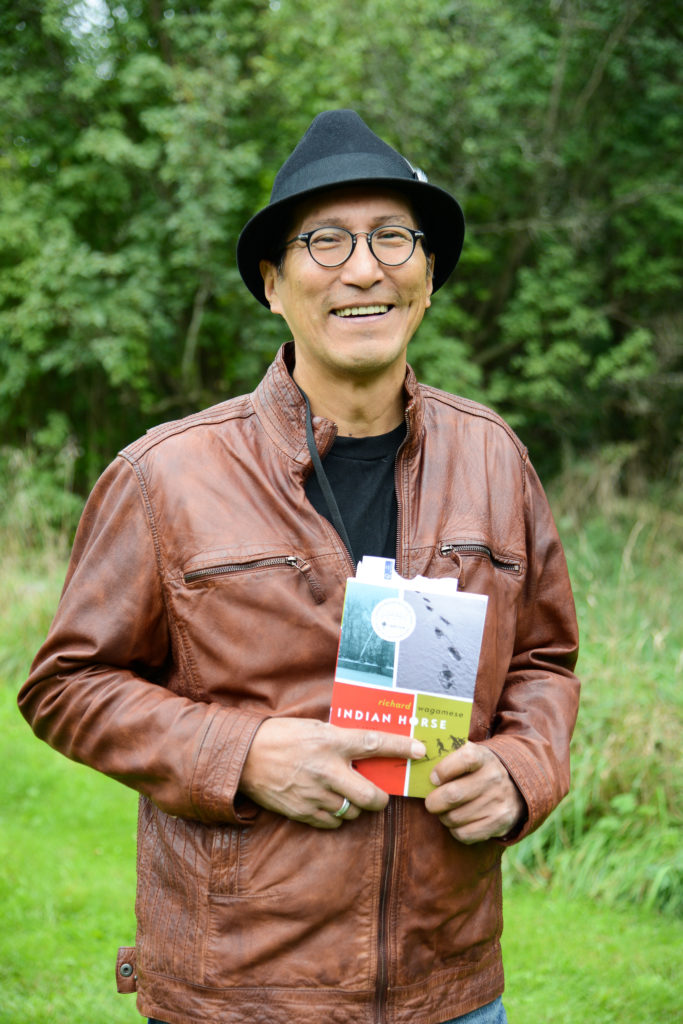By Kathleen Adamson October 18, 2021
What Comes from the Spirit, Richard Wagamese with introduction by Drew Hayden Taylor, Douglas & McIntyre, September 18, 2021, 176 pp., $24.70
This new collection of short works by Richard Wagamese is the third book published since he died in 2017. The pieces within are gathered from the full span of his life, including some of his observations collected from social media. The collection is excellent, and well placed to introduce new readers to Wagamese’s body of work.
Wagamese’s writing voice is exquisitely balanced. His descriptive lyricism sings to the senses, “From my window I watch the sure and elegant creep of the sun across the pine pocked flank of the mountain. Beneath it the mercury platter of the lake and the undulation of the land dancing down to meet it at the reeds where the red-winged black birds sing. The sky is a bowl the colour of old denim.”
But there is depth beyond the poetry—Wagamese describes the interior experience of writing, thinking, and dreaming with a humble but practiced ease. His writing is restrained but not minimalist, thoughtful but not obscure.
The meditative pieces in this book have a devotional quality, “True silence is calm being. True silence is appreciating the moment for the moment. Every breath a connection to my life force, my essence,” seem meant for rumination.
Drew Hayden Taylor’s charming introduction to the book warns the reader, “…don’t read it too fast. Soak it in. Enjoy every morsel. Linger on each page because every paragraph has nuggets of understanding.”

No book has all the answers, but Wagamese’s reflections present a hopeful and compassionate set of values. They feel like a nourishing meal for the heart, with all five flavours present—sweet, bitter, salty, sour, and something umami, important but hard to pin down. He flows through many topics—the importance of children’s education, his brutal encounters with the police, retellings of traditional Ojibwe tales that do not end with the European settlement of Canada, hilarious riffs on how to dress like an Indigenous person, his sadness at the lost traditions of Indigenous people in Canada. On this last subject, Wagamese sums up what is truly at stake in the Canadian ‘reconciliation’ process—not moral or political absolution, but the potential extinction of hundreds of entire peoples.
”The saddest image I carry in my mind is that of the last surviving Indian being asked why it is that he or she has no knowledge of the people and where they came from. And the response. Because I had no one to teach me and I did not understand.”
Fundamentally, Wagamese’s perspective is one of presence, of finding spiritual inspiration and guidance in nature, and in the small tasks of life.
In a world of relentlessly flowing information, the affirmation of the present moment is a useful one. He writes, “The only extraordinary thing I’ve done is to never allow the mistakes of my past to discolour or erode my hope for the future. Because it’s not the big things that add up in the end; it’s the hundreds, thousands, millions of little things we do on a regular basis that define our lives as extraordinary.”
This book was my introduction to Richard Wagamese. When I started reading, I was so excited that I inhaled it quickly. But now that I’ve written this review, I’m going to read it again, and this time, I’m going to take Taylor’s advice – to soak it in and enjoy every morsel.
In recognition of the mentorship Richard Wagamese showed to emerging writers, part of the publisher’s proceeds from this book will be given to the Indigenous Voices Awards to support the next generation of Indigenous literary talent.
Kathleen Adamson is a musician, composer, academic, and community activist based in Montreal, Canada.
More reviews from Kathleen Adamson
Jigging for Halibut with Tsinii: Its relatively still waters run deep September 24, 2021
Deaths of Despair: how the flaws in capitalism are fatal for America’s working class September 9, 2021
Ivan Coyote: Bringing stories of fierce love and community building August 30, 2021
On Time and Water by Andri Snær Magnason made me feel better about climate, ‘if such a thing is possible’ July 21, 2021
Marcus Aurelius: No abstracted ponderer July 8, 2021
Information, the Book: Editors’ efforts have borne excellent fruit June 28, 2021
Hannah Arendt: Deeply influential 20th century thinker embodies contradiction, passion and a proximity to history May 23, 2021
Benjamin Miller: Very rarely does an author take political theory and interpret it with such relevance and clarity May 13, 2021
